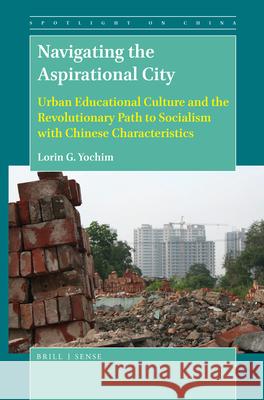Navigating the Aspirational City: Urban Educational Culture and the Revolutionary Path to Socialism with Chinese Characteristics » książka
Navigating the Aspirational City: Urban Educational Culture and the Revolutionary Path to Socialism with Chinese Characteristics
ISBN-13: 9789004381247 / Angielski / Miękka / 2018 / 174 str.
Navigating the Aspirational City: Urban Educational Culture and the Revolutionary Path to Socialism with Chinese Characteristics
ISBN-13: 9789004381247 / Angielski / Miękka / 2018 / 174 str.
(netto: 125,75 VAT: 5%)
Najniższa cena z 30 dni: 131,42
ok. 30 dni roboczych.
Darmowa dostawa!
The re-emergence of China as a world power promises to be the signal economic, political, cultural, and social development of the 21st century. In the face of its rise, fine grained accounts of the shape and texture of this new China are both timely and necessary. Navigating the Aspirational City forwards a theory of contemporary Chinese urban educational culture that focusses on the influence of dominant conceptions of “the good citizen” and the material environment upon parents as they pursue their childrearing projects. The book provides a description of the beliefs and practices of urban Chinese parents as they “educate” their children. These beliefs and practices are placed in relation to a historical chain of ideas about how to best educate children, as well as within the urban context in which they are produced and reproduced, renovated, and transformed. Beginning with a history of revolutionary “orders of worth” culminating in the “aspirational cité,” the book details the shifting standards that define the “human capital” conditions of possibility of a developed modern economy. It goes on to describe a set of policies and practices known as san nian da bianyang by which the whole of one particular city, Shijiazhuang, has been demolished, re-built, and re-ordered. Contemporary China is, the author contends, no less revolutionary than Mao’s, noting that parents’ beliefs and practices articulate with the present ideational and material context to produce what appears, at times, to be radical transformation and, at others, remarkable stability.











